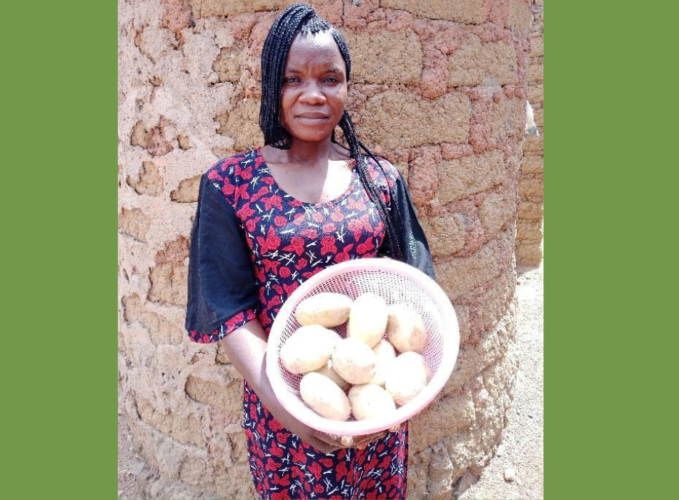Mashed potatoes, French fries, hash browns … Potatoes are an integral part of many people’s diet.
Potatoes are a staple crop in Nigeria, playing a vital role in food security and nutrition. Potato farming in Nigeria is serious business: the west African country is the fourth-largest producer of potatoes in sub-Saharan Africa.
However, Nigerian potato farmers often have low yields compared to regional averages. Why is that? Farmers often use inefficient farming methods, partly due to limited availability of extension officers to disseminate the latest agricultural information.
Farm Radio International set out to change that through the “Radio enabling green innovations at scale” project (phase two). This project, funded by GIZ, the German development agency, used radio to promote good agricultural practices for four crops, including Irish potato, in eight Nigerian states.
Here are the stories of three potato farmers in Nigeria’s central Plateau State who benefited from the project:
From low yields to a bumper crop
Faith Benedict Mallo is a 36-year-old potato farmer in Bokkos Local Government Area in central Nigeria. She farms on half a hectare of land.
Before listening to the radio program Dankali Rumbun Arziki (Potato: a hub for wealth), she struggled to access quality seeds and did not know proper fertilizer application methods. When Faith planted five bags of seeds, she would harvest only 11 bags of potatoes.
Through listening to the program, she learned what kind of seeds and fertilizer to use. She also learned the best ways to apply fertilizer, like burying it 10 to 15 centimetres away from her potato plants. This process, called “side dressing,” allows roots to absorb nutrients better.
After implementing these practices on her farm, Faith was able to harvest 24 bags of potatoes from seven bags of seeds. She used the extra income to offset debts, provide for her family and prepare for the next planting season.
Protecting potato plants against blight
Phoebe Peshik was monitoring her field one sunny morning. When she saw her potato plants, she stopped in her tracks: the “evil attack” was here again.
“I thought I missed my way, tears ran down my face. This spelt danger,” she said.
Phoebe is a 54-year-old potato farmer in Mangu Local Government Area in central Nigeria. Like other farmers in her community, her potato plants are frequently afflicted by late blight. This plant disease, caused by a fungus, causes leaves to turn black and potato tubers to rot.
Farmers say that when they see the disease, they typically resort to “praying and leaving everything to fate.”
After several years of ruined crops and struggling to feed her family, Phoebe started to lose her zeal for farming. That is, until she heard the radio program Dankali Rumbun Arziki. Through this program, Phoebe learned practical tips for controlling potato blight. Things like planting tolerant potato varieties, ensuring proper drainage on her farm and spraying fungicide when the blight emerges.
With these changes, she and her family now enjoy improved yields, income and living conditions. Phoebe is no longer afraid to continue farming.
Access to better markets leading to better income
Though Silas Ibrahim Kwarpo produced large quantities of potatoes, he did not have a large income to show for it.
Silas is a 58-year-old potato farmer in Jos South Local Government Area in central Nigeria. Before listening to the radio program Dankali Rumbun Arziki, he was unable to access bigger markets, which have higher prices. As a result, most of his produce ended up on his family’s table, at the local market at a reduced price or wasted due to spoilage.
After listening to the market information segment and the episode on marketing, Silas contacted the Solanum Farmers Association, which opened the door to bigger, more-profitable markets for selling his potatoes. Nigeria boasts thousands of farmers’ organizations, which may do advocacy at a national level or focus on a specific region or crop. The Solanum Farmers Association is a potato farmers body that supports members to purchase inputs in bulk and also helps market the produce for members.
From the radio program, Silas also learned about the use of scales, a practice that made sure he was selling the right amount of crop at a fair price. He now has increased income to look after his family and undertake other projects. He no longer worries about wasting potatoes.
Learn more about Farm Radio International’s projects here: https://farmradio.org/project/

